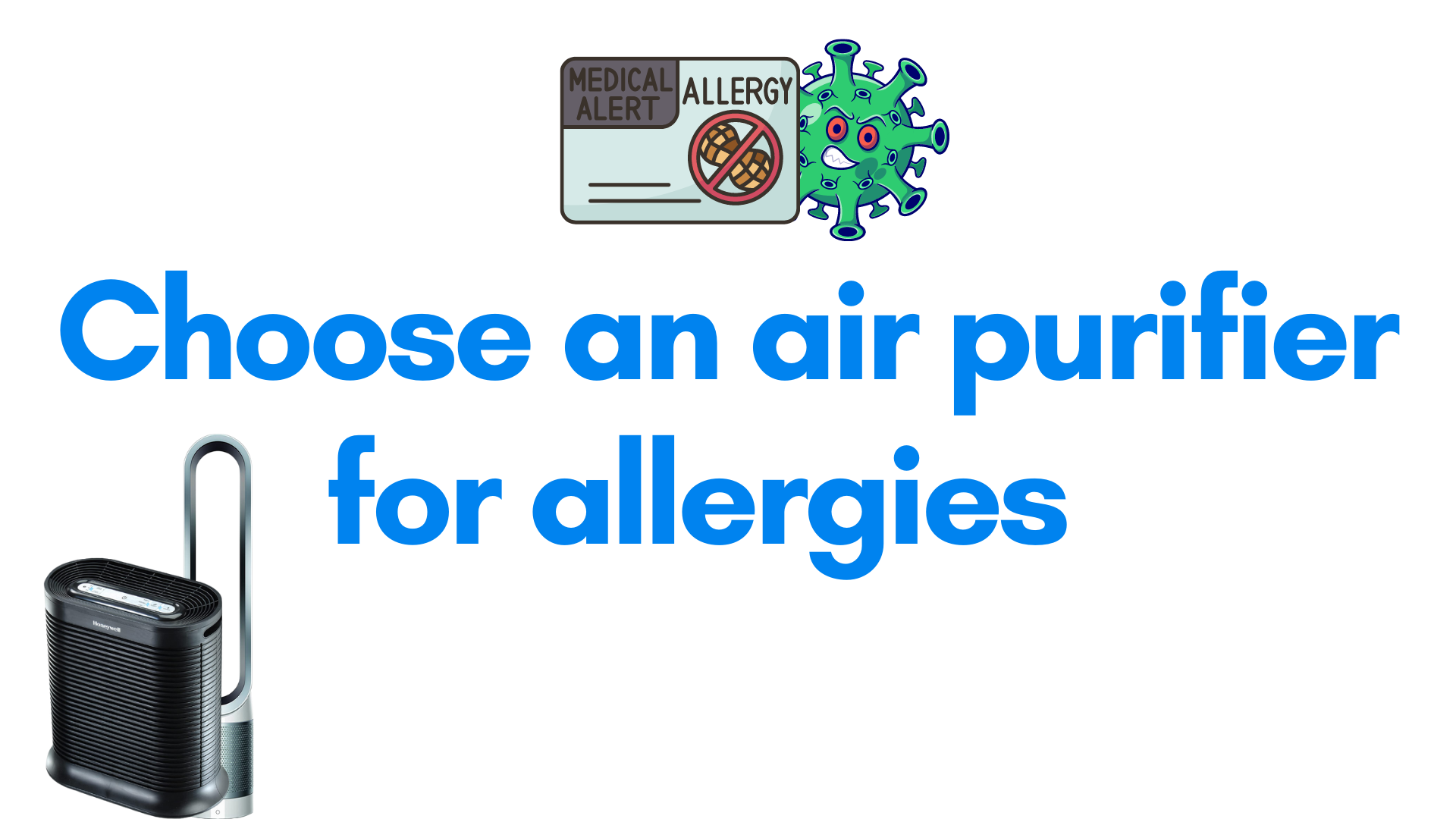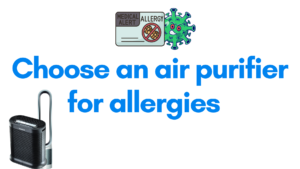
Allergies can be a real pain, and they make you sneeze, wheeze, and feel like your head is stuffed full of cotton all the time. If you don’t get your allergies under control, they can wreak havoc on your life. Coughing, headaches, and congestion can make you miserable. Untreated allergies can also lead to many other illnesses, such as ear infections and sinus problems.
There are different types of purifiers available today, each claiming that it is best for your needs. But there are some features that you must look for when choosing an air purifier for dealing with allergies.
You may find different filters in air purifiers like activated carbon filters, ozone generators, ionizers, and HEPA filters. Among these filters is the HEPA filter, which works effectively by removing allergens from the indoor air. The tiny particles trapped by this filter include dust.
The first thing you have to do is identify what causes allergies in your home environment. It could be dust particles or pet dander or mold spores, and so on. Even cooking fumes and smoke from cigarettes can also cause allergies. The next step is choosing an air purifier with HEPA filters to remove these allergens from the indoors effectively. Suppose you have asthma or another similar lung disease. In that case, you should look for a model with activated carbon filters for removing volatile organic compounds (VOCs) from the air inside your house.
HEPA Filters-air purifier for allergies?
Consider buying an air purifier that comes with HEPA (High-Efficiency Particulate Air) filters which remove 99.97% of the indoor air pollutants from the indoor air that are 0.3 microns in size. These filters can be used for more than two years before replacement. The indoor air contains many tiny particles that can trigger allergic reactions.
HEPA air purifiers come with a dense filter that cleans the matted fibers to trap dust and dirt particles. The air purifiers use three different mechanisms of Impact, Interception, and diffusion to trap the pollutants in the indoor air.
HEPA filters reduce allergic reactions, help people with asthma breathe more efficiently, and improve overall health by removing harmful contaminants from the indoor environment.
If you suffer from allergies or asthma, HEPA is more important than ever. Regular air purifiers do not capture many of these particles passing through their filters. As a result, opening a non-HEPA unit can cause symptoms to flare up!
What do you want to filter?
Air purifiers come with various options. Whether you want purifiers with HIPA filter, ion filter, or UV air filter, every filter has unique features.
As per the research, carbon filters are not good at removing pollen, dander, dust, and mold, but they help get rid of particles and odors in the air.
I have a chart that will help you decide what type of filter you need based on what you want to filter.
| Types of air filters | How they work and what they target |
| High-efficiency particulate air (HEPA) | pulpy media air filters remove particles from the air. |
| Activated carbon | Activated carbon removes harmful gases from the air. |
| Ionizer | an ionizer uses a high-voltage wire or carbon brush to remove particles from the air. The negative ions interact with the air particles, causing them to attract to the filter or other objects in the room. |
| Electrostatic precipitation | Similar to ionizers, this uses a wire to charge particles and bring them to the filter. |
| Ultraviolet germicidal irradiation (UVGI) | UV light inactivates microbes. This doesn’t pull out the microbes from the space — it only inactivates them. |
| Photoelectrochemical oxidation (PECO) | The Photoelectrochemical oxidation (PECO) new technology helps to remove small particles in the air with the photoelectrochemical reaction that removes and destroys pollutants. |
Based on CADR. What is the Clean Air Delivery Rate?
The Clean Air Delivery Rate (CADR) is important to consider when looking for an air purifier. A rating above 350 m3/ hour is excellent for purifying indoor air. CARD counts the air cleaner’s effectiveness according to room space and volume of clean air produced per minute.
In other words, the CADR tells you how quickly an air purifier works to clean the air in your home. So if you’re looking for a fast-acting purifier, look for a high CADR number.
Based On the area, you want to filter.
Choosing the right size air cleaner for your home can be a challenge. Select Accordingly to the size of your room, the number of allergens in it, and the amount of time you spend in it.
Think about how you use your space. Remember that these figures are based on using the machine at its highest speed or noisiest speed. For less sound, you may want to have a unit capable of effective cleaning when running at less than its maximum blower speed.
This may be sufficient for your needs, but a larger unit in the same room can produce more air changes per hour, thus decreasing particle levels by 90% or more—the correct target in medical situations. The CADR comes in use, and they recognize the number of particles and square feet an air purifier can reach, so go for high CADR.
Do air Purifiers reduce allergy symptoms?
Air purifiers in the house are only known for cleaning the air quality because of no official recommendation. but Here are some of the experts say on the air purifiers for allergy symptoms
- Placing a HEPA filter air purifier in the bedroom improved people’s allergic rhinitis symptoms by reducing the concentration of particulate matter and house dust mites in the air.
- Out of 49 people, 46 people completed the trial, and it proves that the people who use PECO filters air purifiers had decreased allergy symptoms over four weeks.
- SOURCE: NCBI
Which Air purifier is best for allergies?
We have selected some of the best air purifiers for allergies. Check out the air purifiers based on allergies according to price and types.
What is our Choice?
In the market, several options are available, but as per our research, these are the best air purifiers for allergies.
OUR PICKS
Dyson Pure Cool TP01
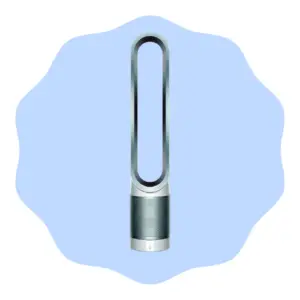
Recommended For: Larger Rooms
- Dyson pure Cool can remove 99.97% of allergens and pollutants that are size on of as small as 0.3 microns, including dust, pollen, mold spores, bacteria, and pet dander.
- It has a Tower fan and HEPA air refresher in one.
Molekule Air Mini
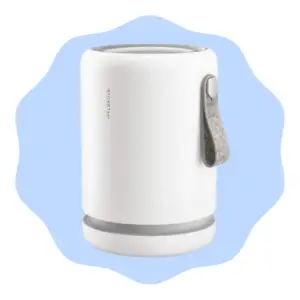
Recommended For: Small rooms
- It uses a PECO filter to kill VOCs, volatile organic compounds, mold, and pollutants.
- Perfectly made for small workspaces such as bedrooms and work offices, it can cover an area of 250-square foot room every 60 minutes.
Rabbit Air MinusA2

Recommended For: Extra large spaces
- Rabbit Air MinusA2 is an air purifier that prevents odors and pollutants and has six levels of filters, Including HEPA, negative ions, and activated charcoal carbon.
- Control over the app using Wifi, covering an area of up to 815 square feet.
- It can be customized based on your needs and catch germs, pet dander, toxins, and odor.
Honeywell True HEPA
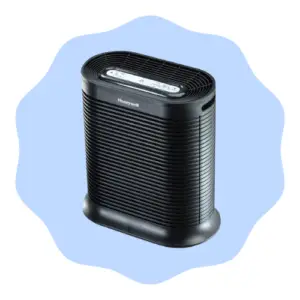
Recommended for: Medium-size rooms
- The Honeywell True HEPA is best for medium-sized rooms. comes with a HEPA filter and claims to capture “up to 99.97 percent of microscopic allergens, 0.3 microns or larger.” I
- Carbon pre-filter for reducing unpleasant odors.
Levoit LV-PUR131S Smart True HEPA

Recommended for: Medium-size to large rooms
- The Levoit LV-PUR131S Smart air purifier comes with three-stage air filtration: a pre-filter, a HEPA filter, and an activated carbon filter.
- Levoit removes pollutants, odors, pollen, dander, allergens, gases, smoke, and other particles from your home air.
- Alexa-supported plus comes with an app that lets you control the purifier’s different modes accordingly to your house’s air quality using Wifi.
FAQ
Air purifiers for allergies do they work?
Yes, Air purifiers for allergies work. Air purifiers are not as effective as medical asthma treatments, similar to inhalers. Still, they can prevent the aeroallergens like mold, pet dander, and pollens and remove the allergies from the air.
Are air purifiers good for allergies?
Consider buying an Air purifier to prevent allergies such as Dust mites, mold spores, pollen, and pet dander.
